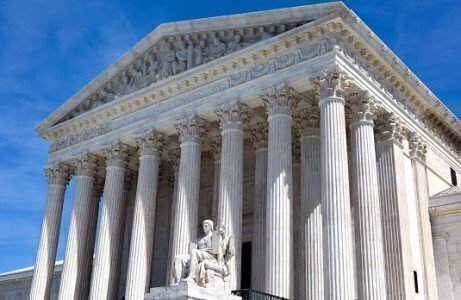On Wednesday, the Supreme Court heard arguments in the closely watched case of Lee v. Tam, which seeks to settle an argument over the government’s ability to ban all trademark protections for names it deems to be offensive.

So far, Court watchers think that most of the Justices seemed skeptical that every possible offensive trademark could be barred by the federal government’s U.S. Patent and Trademark Office under powers granted to it by the 1946 Lanham Act. If the PTO sounds familiar, it is the same office that revoked the trademark for the Washington Redskins football team, which it also considered (at least, the “Redskins” part) as offensive.
Link: Read The Argument Transcript
The Tam case involves a rock band called the Slants, who are based in Portland, Oregon. The band consists of four Asian Americans, and it acknowledges that its name has been used as a racial slur; however, the band also says that its name follows a “long tradition of ‘reappropriation" in order to reclaim racial slurs and take away their power.
The band's application to trademark its name was denied by the PTO in 2011. The Trademark Office can deny any trademark that alludes to “immoral deceptive, or scandalous matter; or matter which way disparage or falsely suggest a connection with persons, living or dead, institutions, beliefs or national symbols, or bring them unto contempt, or disrepute.”
The Slants took their fight to court, and in December 2015, the U.S. Court of Appeals for the Federal Circuit ruled that the band’s name was “private speech and therefore protected by the First Amendment” and that part of the Lanham Act was invalid under the First Amendment. The Trademark Office appealed the decision to the Supreme Court.
In Wednesday's arguments, many of the Court’s eight Justices wondered why the band’s name wasn’t protected by the First Amendment, when it came to trademark use.
“I always thought that government programs were subject to one extremely important constraint, which is that they can't make distinctions based on viewpoint,” argued Justice Elena Kagan, as Assistant Solicitor General Malcolm Stewart tried to parry various questions from the Justices.
“The point is that I can say good things about something, but I can't say bad things about something. And I would have thought that that was a fairly classic case of viewpoint discrimination,” Kagan said, as she continued to question the government’s arguments.
Justice Ruth Bader Ginsburg focused on the issue of possible arbitrary interpretations in trademark rulings.
“The questions have concentrated on viewpoint discrimination, but there's also a large concern with vagueness here, and the list that we have of things that were trademarked and things that weren't. Take, for example, one had the word ‘Heb,’ and that was okay in one application and it was not okay in another,” Ginsburg said.
Justice Kennedy seemed to question that concept that no offensive trademarks could be banned by the Trademark Office. Kennedy pondered a hypothetical case where a non-Asian band would dress and act in a way to insult Asians. “The Congress, in your view, could draw no statute denying trademark protection in the hypothetical case,” Kennedy asked Larry C. Connell, the attorney for The Slants.
At the end of arguments, Justice Samuel Alito questioned an argument made by the government that offensive trademarks could be regulated if they offended a foreign government.
“An awful lot of things are copyrighted in this country that are deeply offensive to some foreign countries, and yet, the FBI enforces the copyright laws,” Alito said.
Scott Bomboy is editor in chief of the National Constitution Center.






